Andrew Roberts
Family stories about experiences involving the Trumpington Prisoner of War Camp, including Frank and Joan Edwards (information from Jo Speak) and Henryk and Tania Zmura (information from Alex Giasemidis and Tania Zmura).
This is one of a number of pages about the Trumpington Prisoner of War Camp.
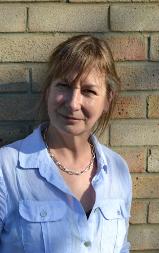
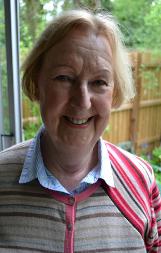
At the opening of the Clay Farm Centre in March 2018, Alex Giasemidis and Genny Bailey talked to Andrew Roberts after seeing photographs of the Trumpington Prisoner of War (PoW) Camp in the Changing Face of Trumpington display. Alex and Genny provided an introduction to their mother, Tania Zmura, and Alex’s son’s girlfriend’s mother, Jo Speak, and Andrew Roberts and Howard Slatter interviewed Tania, Jo and Alex in April 2018. Their family stories provide an insight into the Trumpington Camp and 1940s Cambridge and Trumpington.
First, the story of Jo Speak’s grandparents, Frank and Joan Edwards, and Jo’s mother, Maureen (Molly) Ann Edwards.
The Edwards family lived at 191 Mill Road, Cambridge, during and after the War. The home included a barber’s shop, with Frank working as a barber and Joan doing hairdressing.
Jo said that Frank Edwards was a close friend of Jack Overhill, who mentioned him many times in his wartime diary (edited by Peter Searby, 2010). Jack and Frank used to swim in the River Cam at Byron’s Pool every day through the year. When one of Jack’s books, The Snob, was published in 1947, he gave an inscribed copy to Frank.
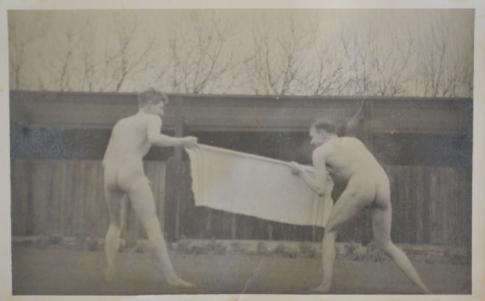
Jo said that Frank was a conscientious objector. He went before the Cambridge Tribunal for Conscientious Objectors on 20 August 1940 and was sentenced to a term in Bedford Prison (there is a full account in Jack Overhill’s diary, p. 34-36). On 17 January 1941, Frank appeared before the London Appellate Tribunal, supported by Jack Overhill, when his appeal was dismissed (p. 73-75). On 8 September 1941, Frank was subject to a further case at Cambridge Guildhall, when he was sentenced to three months in prison and Jack phoned Joan Edwards to let her know the outcome (p. 116-117). The family has two letters written by Frank while in prison.
When Frank was discharged from prison, he had a period in Trumpington Camp, where he had to do hard labour. At times Frank worked on a farm. In his diary entry for 4 November 1942, Jack Overhill refers to Frank driving Italian prisoners backwards and forwards in a lorry to their work on farms (p. 191). Jo said he had to guard Italian prisoners and had a rifle, but would hand this to the prisoners when they were getting off the truck. She added that Frank was allowed home in the evenings.
In his diary entry for 18 November 1943, Jack mentions going to the field on the Harston road to meet Frank who was the ganger with a group of Italian prisoners of war, when he was introduced to one of the prisoners called Rossi, a 23 year old from Milan with good English (p. 247). He took the gang a gift of apples (p. 248).
By 1944, Italian prisoners were able to visit Frank and Joan’s home and the family made good friends with a number of them. The family has a letter from Claudio Rossi to Joan Edwards dated 8 April 1944, where he writes that he is disappointed to have been refused permission to spend the day with her, but this permission must have been forthcoming soon afterwards. Jack’s diary entry for 19 April 1944 refers to him taking an Italian-English conversation book to Frank’s house for Frank to give to Claudio (p. 264). In September 1944, Jack had a phone call from Claudio who was at Frank’s house and Frank took Claudio to Jack’s house on his tandem, writing that “with other Italian prisoners he now has his liberty and can now visit cinemas and people’s houses at invitation” (p. 283). On 19 October, Jack wrote “There has been some correspondence in the Cambridge Daily News about the easy time Italian prisoners are having about here and Frank Edwards tells me Rossi says he walks about in shame. Rossi, a midget, is working for a farmer who makes him carry 18 stone of corn [c. 107 kilos], and he does it because he’s afraid that if he doesn’t he’ll be shifted to another camp …” (p. 287). On 4 February 1945, Jack noted that Claudio was a male nurse at the PoW camp on Hauxton Road (p. 297). Claudio’s English was now very good and he was able to help Frank’s daughter, Molly, with her homework (March-April 1945, p. 298-300). On 11 December 1945, Jack mentioned that Claudio has just taken an examination in English (p. 327).
Frank’s daughter, Molly Edwards, was given an autograph book by a group of the Italian prisoners. This has the names of a number of prisoners and pages of very attractive illustrations dating from 1944 to 1946. Names in the book include: Valerio Scandolari, Tione, Trento; Lamberto Pasquali (see footnote), Monestirolo, Ferrara; Claudio Rossi; Federico? Rossi; Sgt. A.G. Schieppati?; L. Pasinetti; V. Valeute.
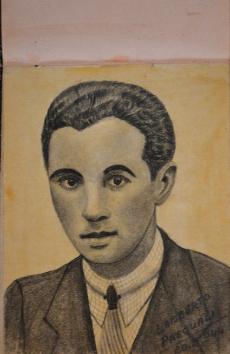
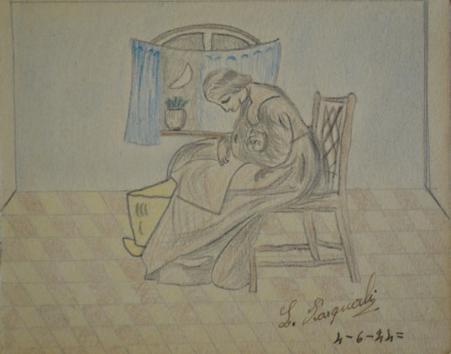
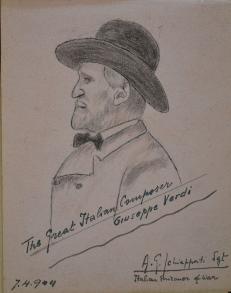
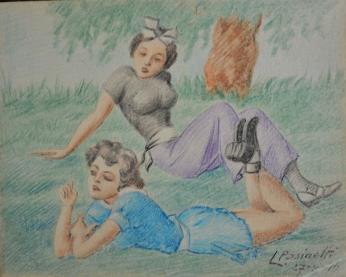
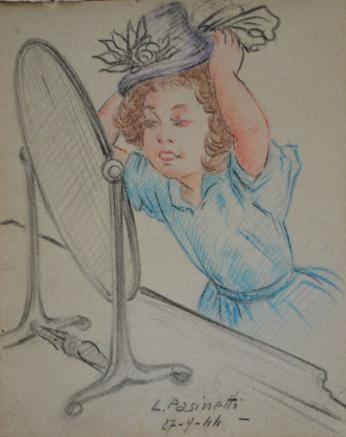
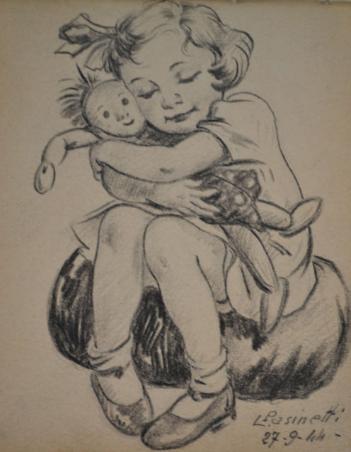
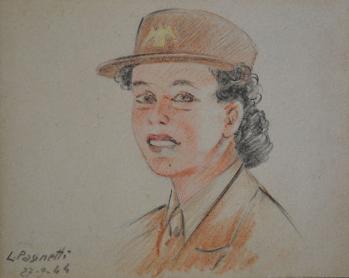
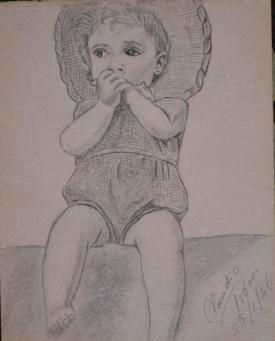
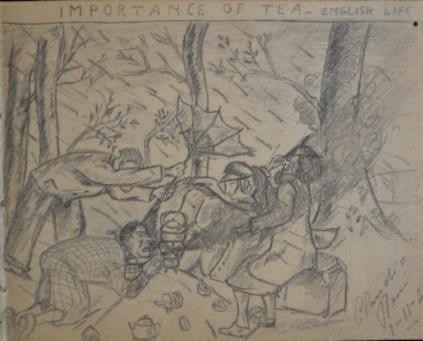
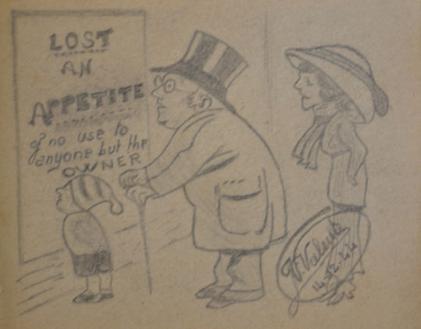
Jo said that Frank also made friends with a German prisoner. When that person wanted to phone home to check on his family, Frank was able to help.
The family visited ex-prisoners of war in Italy after the War, a practice that continued until Frank and Joan were elderly. They were particularly close to Claudio Rossi, who exchanged family photographs. Jo said that Molly is still in touch with Claudio’s daughter, Christina (April 2018).
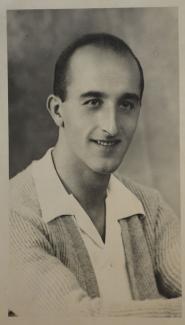
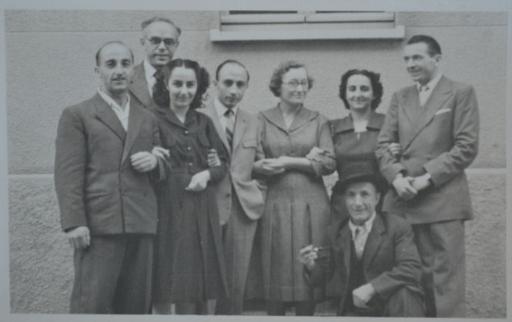
Frank Edwards later went to college to study carpentry.
Joan and Frank died in 1998 and 1999. Jo Speak wrote an article about her grandparents and their exploits, published in The Guardian in 2011.
Now, the story of Alex and Genny’s parents, Henryk and Tania Zmura.
Tania said that Henryk Zmura’s father was in the Polish Home Army (Underground resistance) during the War. Henryk was born in 1930 and grew up in harsh conditions on the family farm. At the end of the War, Henryk was aged 15. His father realised that the communists would take over Poland. His father was in Germany at this time and arranged for a man to bring a message to the farm to tell Henryk that his father wanted him to leave Poland. Henryk fled from Poland on a French diplomatic train that came from Russia. He joined up with his father at an American base outside Munich, where part of the Polish army was located. At the camp, Henryk was made a Polish Army Cadet. His father went back to Poland to fight communism and was put into detention for 15 years.
Tania said that Henryk travelled from Munich to Bari, Italy, walking and hitchhiking. There were Americans everywhere at the time, with canteens available in railway stations. He went to school in Bari then moved to Naples, from where he was sent on a troopship to Glasgow with 450 other boys. They arrived in Glasgow on a public holiday, with no food available as they were not expected. From there, the group went by train to Petworth where there was a Polish Resettlement Camp on the estate. Henryk’s next move was to Fordham (?), near Newmarket, where he continued to study and work. British people were showing resentment towards Poles being accommodated in camps, with posters such as ‘Poles Go Home’. However, in retrospect Henryk felt that the move was excellent, as the Poles had to assimilate. (There is no record of a Camp at ‘Fordham’, a village to the north of Newmarket; it might have been a Polish Resettlement Camp or PoW Camp 71, at Lower Hare Park, to the south west of Newmarket.)
Henryk moved to the Trumpington Camp in 1947. Tania and Alex said that Henryk spoke very positively about living in the PoW Camp, where there were Polish and Italian men and British ex-soldiers who were using it as a hostel. There were no PoW’s there at that time. There were no families there, unlike at the camps at Thetford and ‘Fordham’. (Thetford probably refers to Camp 630, which was at Kilverstone Hall, Thetford.) The Camp was being used as a midway base for people coming out of the army. It was very well organised on military lines by Polish army people, with everything ‘spick and span’, including running the canteen. Henryk would walk or take a bus to and from Cambridge. He continued to study, being taught by Polish teachers. It was very hard for the teachers who stayed in Britain, while those who returned to Poland were killed.
Howard Slatter understood that Polish men at Trumpington Camp were given additional education by lecturers who came to the Camp and the men were then employed on local farms. Tania said that the father of a friend owned Wells Farm, Whittlesford, where Italian, German and Austrian PoWs worked. Alex understood from Henryk that a lot of Italian prisoners were due wages after the war and some used this money to buy modest homes in Cambridge.
Tania said that Henryk understood that the Italian PoWs at Trumpington Camp made two lion heads out of concrete, but these were stolen after the Camp closed.
When the Camp closed, Henryk went to work at Pye’s. He shared a room with another Polish man. There was little food as it was still rationed, so he went to work washing pots at St John’s College, where food was provided! He then moved to St Catharine’s College, living in college. The College paid for him to do a City and Guilds qualification and he became a chef and later a head chef.
In the mid 1960s, Tania joined an evening class at Chesterton School, led by a person who was head of upholstery at Robert Sayle. Henryk realised that he knew the person taking the course, as that person had been waiting to be demobbed after the War.
Tania’s grandparents were Russian émigrés. Her great grandfather had organised hunting trips for the Czar. Her parents settled in Belgium and then the Belgian Congo. Tania said that the family were living in the Belgian Congo when she was sent to summer language school in Cambridge, aged 20. She became friendly with a German girl and went with her to a dance at the Dorothy Ballroom where she met Henryk and was married within 4 months.
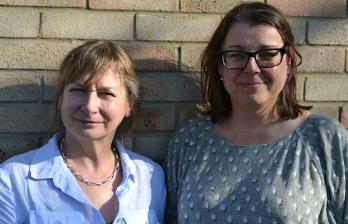
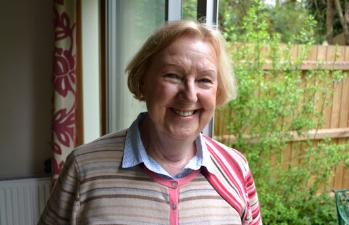
Footnote: In November 2021, we heard from Ashley Maylin, whose grandfather, Frederick Pearson, lived at Westwick Farm, bordering the airfield in Oakington. Ashley remembered his mother, Mary Maylin née Pearson, the eldest daughter of Frederick Pearson, saying that Italian Prisoners of War worked on the farm. One of these was Sergeant Lamberto Pasquali, who worked on the farm in 1943 and did a drawing of Mary Pearson.
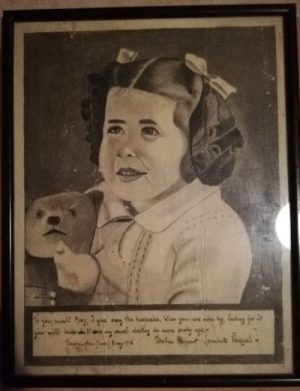
Ashley adds that the drawing meant a great deal to his mother, who had it framed and displayed. The drawing has the text “To you, small Mary, I give this keepsake. When you are more big, looking for it you will know what was my cruel destiny in more pretty age. Trumpington (Cambs), 8 May 1943. Italian by Sergeant Lamberto Pasquali.”.
Sources
Personal communications with Tania Zmura, Jo Speak, Alex Giasemidis and Genny Bailey, April 2018.
Searby, Peter (2010). Cambridge at War: The Diary of Jack Overhill, 1939-1945 . Cambridge Records Society. (Cambridgeshire Collection and Clay Farm Library, C.45.7)
Speak, Jo (2011). ‘Snapshot: my grandfather the river swimmer’, The Guardian, 6 August 2011.
PoW Camps.
Polish Resettlement Camps including Petworth and Thetford (5 camps).